Written by Beverley Lennon
We all love Bali. But do you know that so many of us are actually killing the island through our actions (though we are often not aware of it)?
Yes, we mean all of us tourists are guilty, when we indulge in long baths during our holiday, or choose to buy exotic animal products as souvenirs. When was it that we asked deeper questions before we signed up for a dolphin tour package?
Of course, we don’t mean that you should stop enjoying yourselves, but as real Bali lovers, can we take a closer look at how we can also do good to the locals and the environment even as we travel?
There is no magic wand; all of us need to do our best to keep Bali as the sacred place it is.
So for a start, let’s take a closer look at 5 environmental problems we are contributing to (often unknowingly) and what we can do to help minimize them! Time to be conscious of our actions and work towards a greener and happier Bali!🍃
Also read: 8 Things you need to know about Bali’s dog meat trade and animal abuse problem
1. You might be swimming in sewage water (yes in the sea)
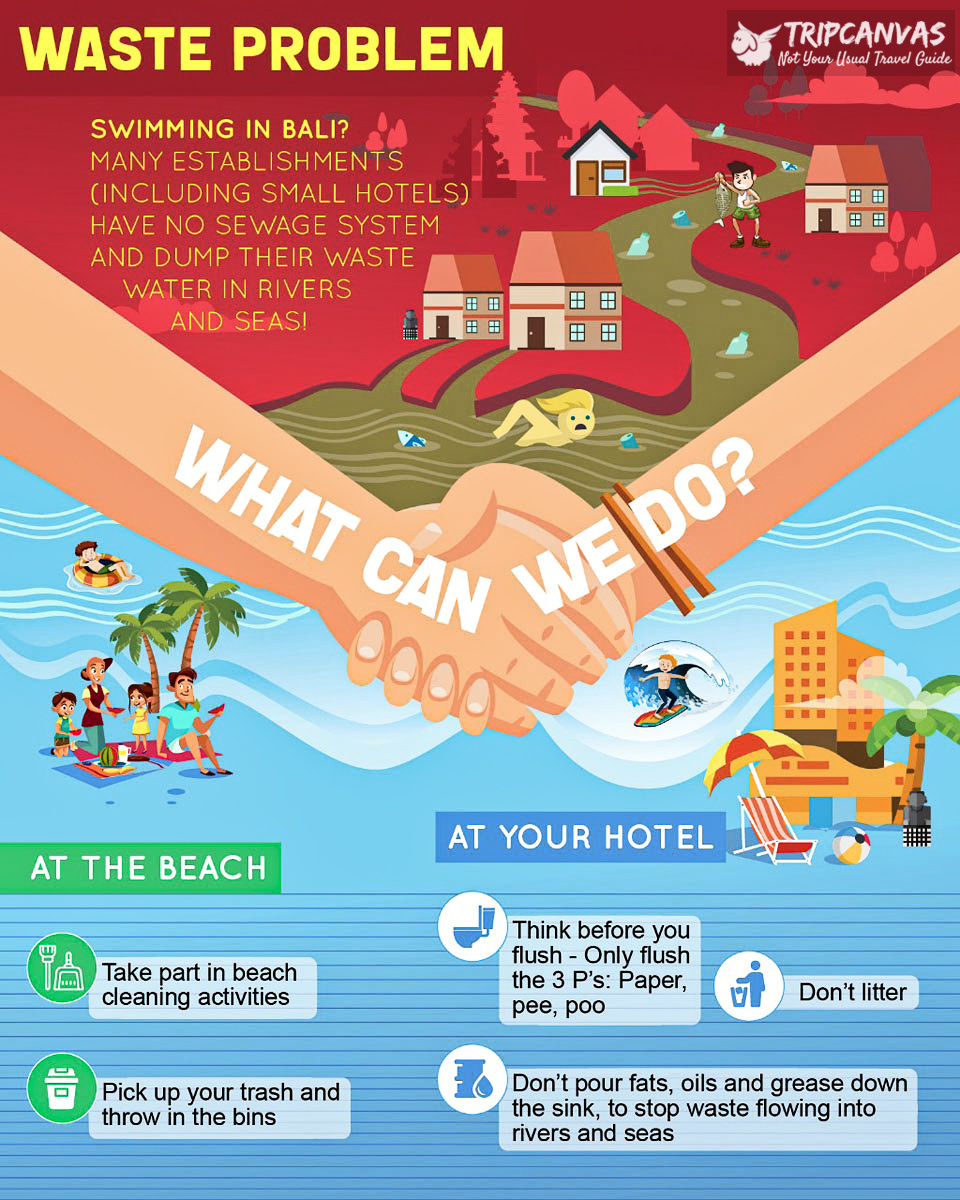
The problem:
While big hotels and resorts are connected to the water treatment system in Bali, other small establishments and locals themselves have developed their own wastewater installations but these do not meet acceptable standards.
Even worse, many of them simply dump all their wastewater (yes the dirty grey water) into open waters – including rivers and well, the sea you swim in! 😱
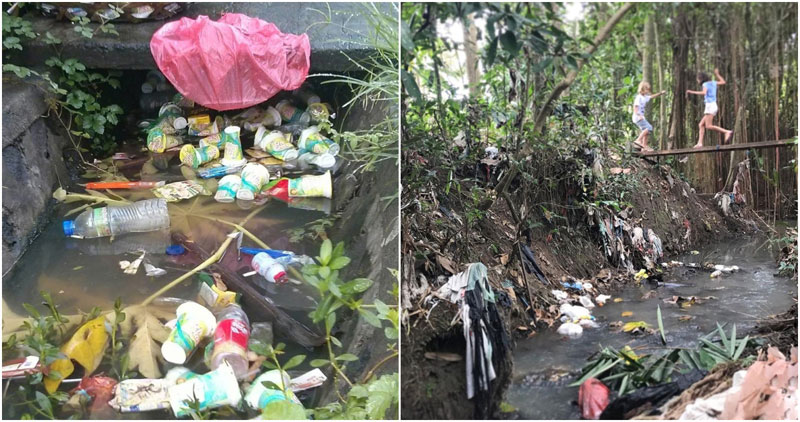
From the locals’ point of view, the cost of a monthly connection to the sewage system is often too expensive, so they resort to dumping their sewage into the streams that flow into the open seas!
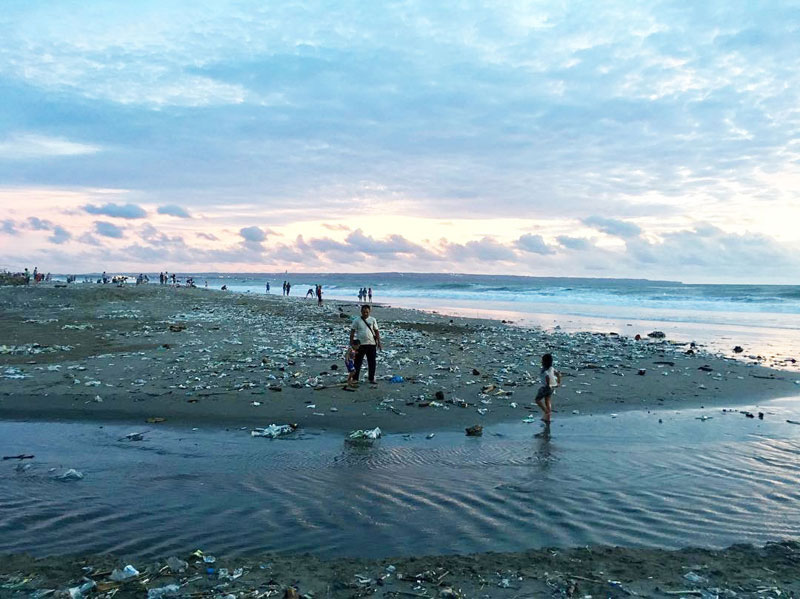
One good example is the array of small bars and restaurants along Batu Bolong Beach, where I personally noticed that all the used water just flows from the pipes to form a greyish stream that flows across the sand to end right into the sea – yes right into the surfers’ paradise! This is only worsened by the problem of trash and plastic too!
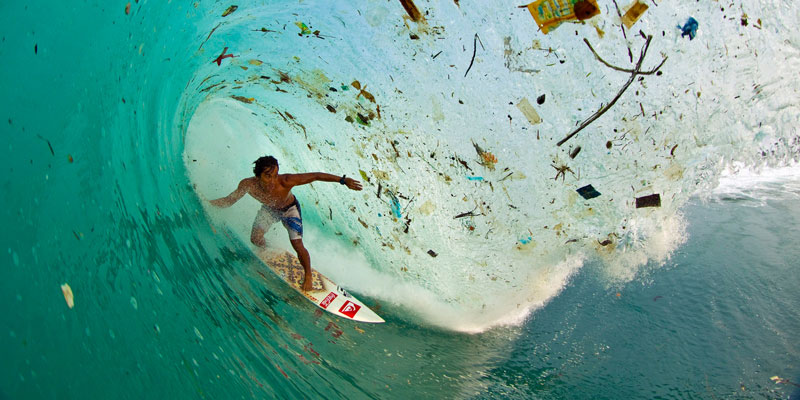
Swimming in such polluted waters increases the probability of catching various infections, such as ear infections, which are now common among tourists in Bali. Make sure to dry yourself off thoroughly after a dip!
What can you do?
The name of the game here is pollution. In the broader scale, this means cracking down on establishments and individuals that refuse to connect to the sewage system, or extend assistance to those who can’t afford it.
But to minimize the alarming issue, you yourself as a tourist can help:
-
Don’t add to the trash, help pick up litter! (You can consider initiatives by Eco Bali Recycling and Green School)
-
Recycle and use less plastic. Find alternatives and use biodegradable items such as eco-products offered by Avani Eco, where you can easily opt for eco plastic bags made of cassava, biodegradable wooden cutlery, non-plastic straws, compostable bio-boxes and many more!
-
If you are living in Bali for the long term, why not ask extend your sewage system subscription to your neighbours? You can consider talking to them about the many benefits and they will surely be grateful for the help!
2. Your daily romantic bathtub soak takes water away from the local paddies!
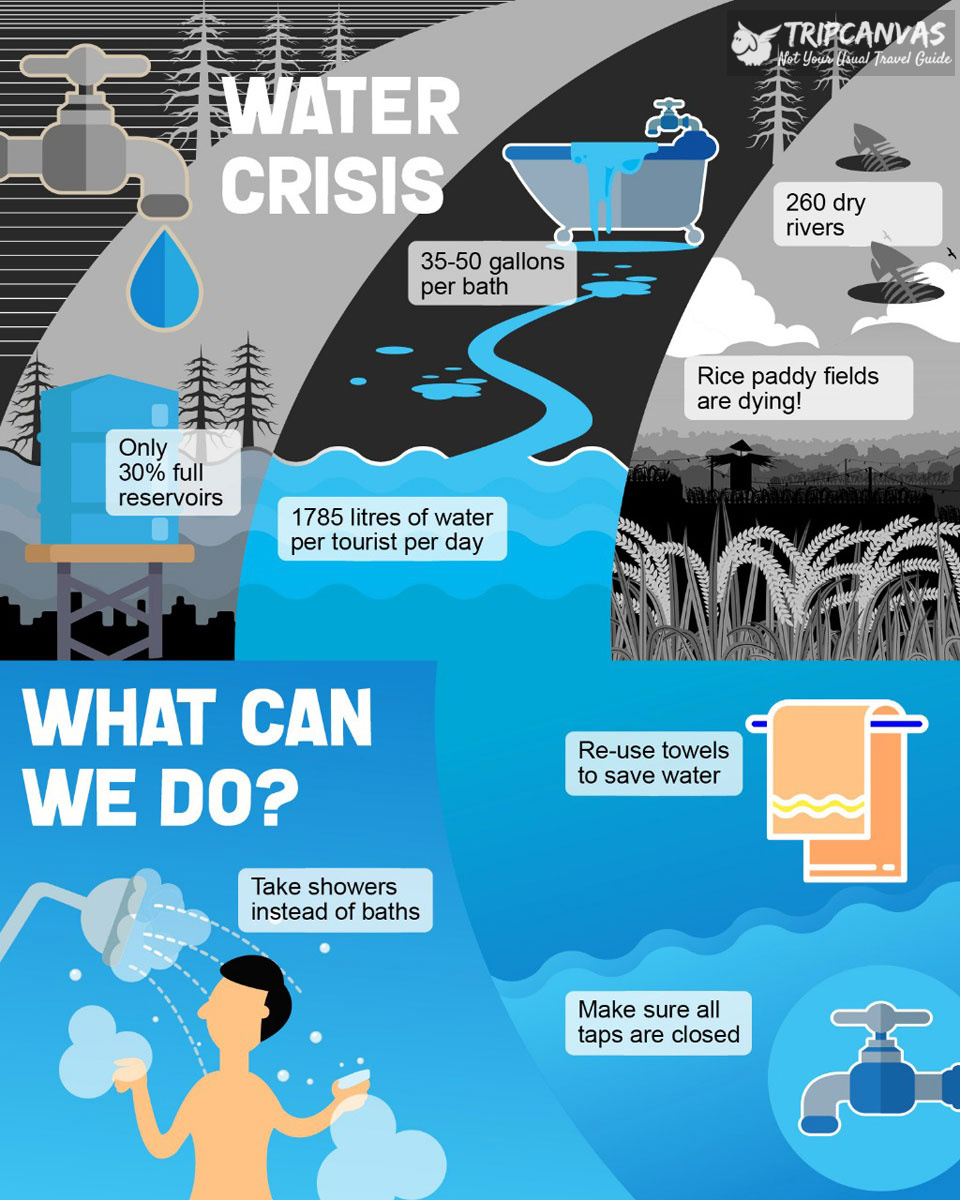
The problem:
Yes, believe it or not but you are not only bringing in money to the locals but you’re also stealing their water! Rivers and reservoirs are drying off on the island! Most of the groundwater is channeled to luxury resorts and villas for you to enjoy. Bali is in the middle of a water crisis!
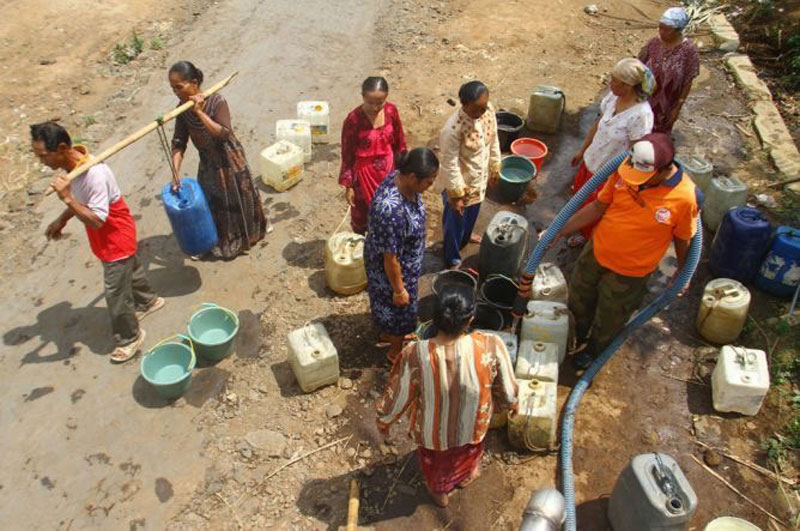
While tourism makes up 80% of Bali’s economy, it also translates into taking up 65% of Bali’s groundwater, leading to 260 of 400+ rivers in Bali running dry!
It is clear that the island is struggling to cope with diminishing water resources; even its biggest body of fresh water, Lake Buyan, has dropped 3.5 metres with reservoirs being only 30% full! Still thinking about this warm bath waiting for you at the hotel?
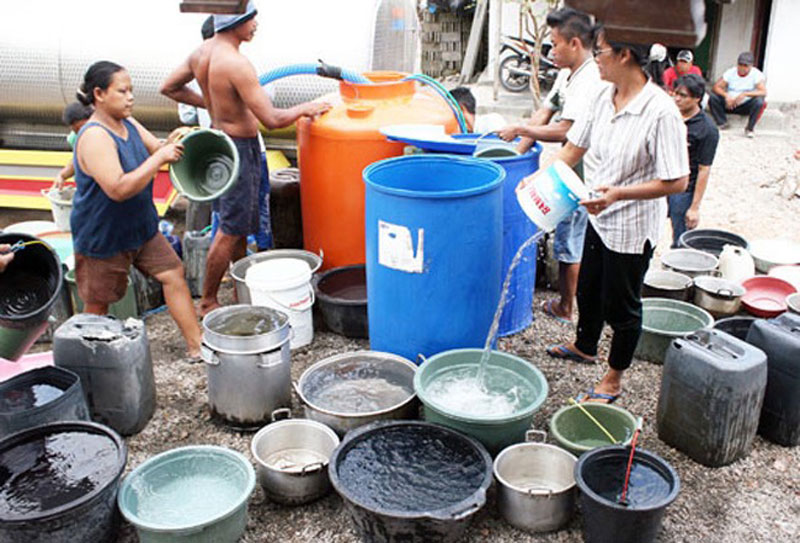
We’re all guilty of it. We indulge in long warm bathtub soaks and enjoy dips in infinity pools and jacuzzis, but did you know that in the paddy fields, the locals are suffering from a lack of water for irrigation and farming? They even have to steal from neighbours for their everyday water needs and living in worry while we relax with feet in THEIR water!
While in Bali, I personally noticed that even the rice fields in Ubud rarely had water as it was being skewed away from agriculture to tourism!
So the next time you’re filling in your hotel’s bathtub to drop your bath bomb and relax in; think about the locals, as you are contributing to overconsumption of water and groundwater depletion just for the sake of indulgence!
Alarming fact: Official data reveals that a tourist uses an average of 1,785 litres of water per day compared to the 14 litres used by a local Balinese!
What can you do?
We can all help to reduce the water crisis in Bali. It takes everyone to reduce the threat of water scarcity, both locals and visitors, so first of all it is important for all of us to promote water stewardship:
-
Take shorter showers
-
Avoid taking a bath in the bathtub
-
Collect rainwater for garden use
-
Ensure that all taps are properly closed at your hotel/villa after use
-
Reuse your towels (it helps to save water too!)
Look out for the annual eco-festival Sustainable Solutions to get to know more about saving water in Bali!
3. You are not watching the dolphins; you are stressing them!
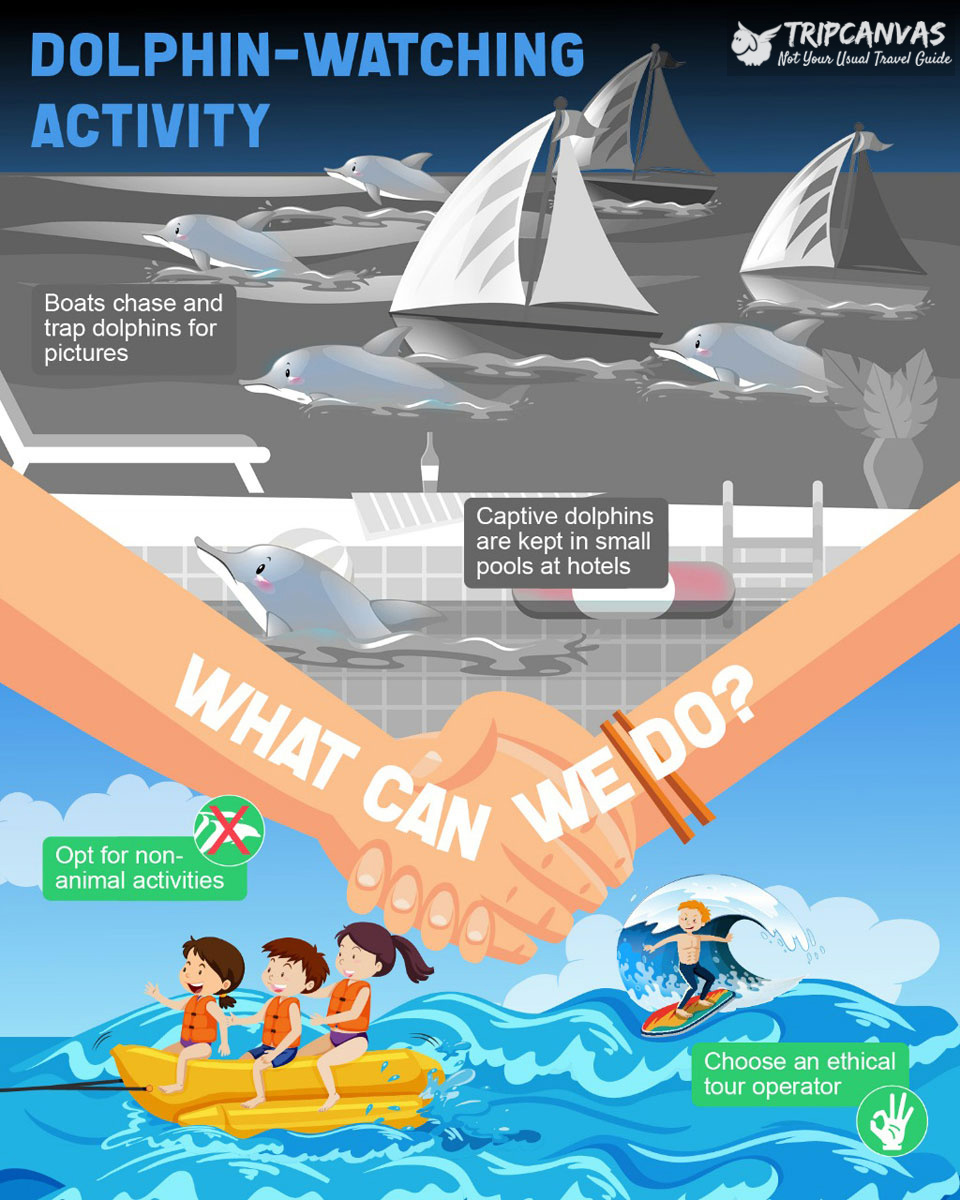
The problem:
We agree, swimming with wild dolphins is a common ‘bucket list’ goal among all of us, but do you have any idea on how much pain and suffering it takes for a tourist’s dream to become reality?
Dolphin-watching has long been a popular activity in Bali, especially in Lovina but in the quest of getting closer to these beautiful creatures, you might overlook the impact as dolphin-watching is conducted without control in Bali.
Two of us have gone on one of these dolphin-watching trips, and when we were there, we noticed that several boats (packed to the brim with tourists) are brought to deeper waters for dolphin-viewing. And much to our horror, the boats actually chased after these poor dolphins, such that the animals become trapped between boats – just so that tourists can take pictures!
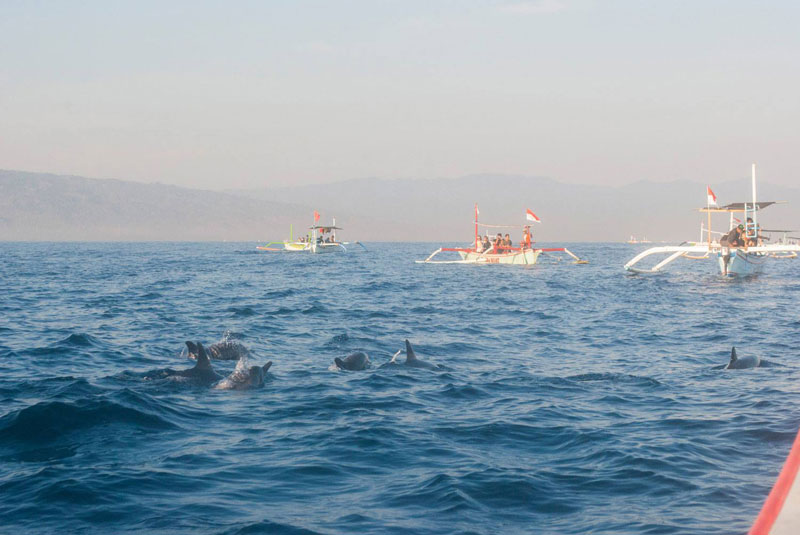
Dolphins are vulnerable to many forms of human disturbance so it is important for you to know about the impacts of such activities. To worsen the situation, many tour companies organize dolphin-watching all year around without giving the marine environment a breathing space!
Some dolphins are even said to be kept in captivity by hotels – chased by boats, taken from the wild, kept in nets before being thrown into chlorinated pools. One example is the Melka Excelsior in Lovina – the hotel offers dolphin shows within their premises. The poor depressed-looking dolphins are kept in small green water pools at the hotels.
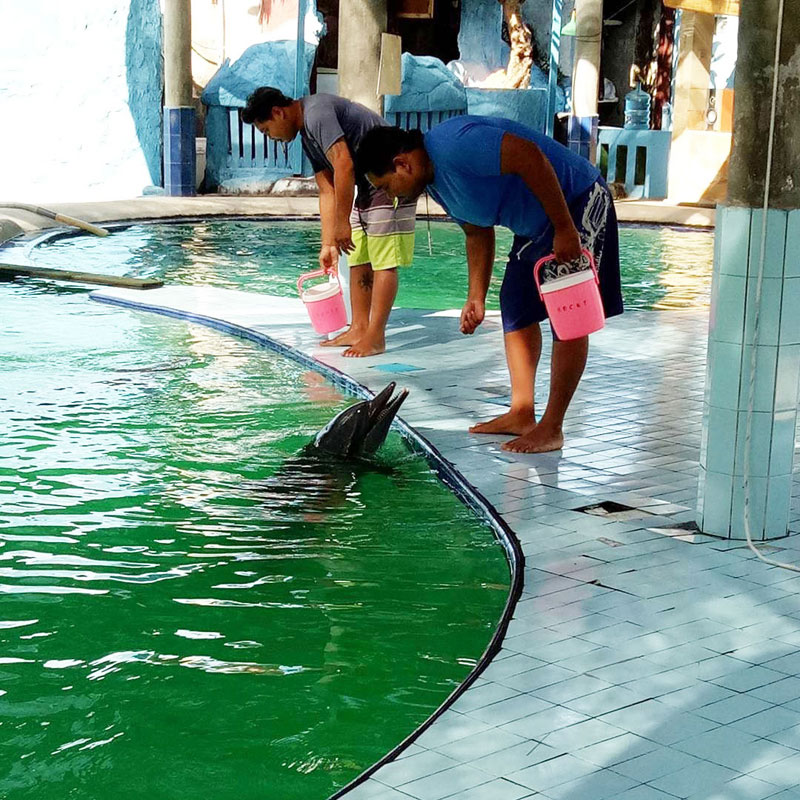
With some research, we also understood that usually captive dolphins are trained under horrific conditions, and they are also forced to learn tricks for the sake of tourists’ entertainment. Due to the captive stress, many often depend on antibiotics for survival. The stress of captivity can also cause heart attacks.
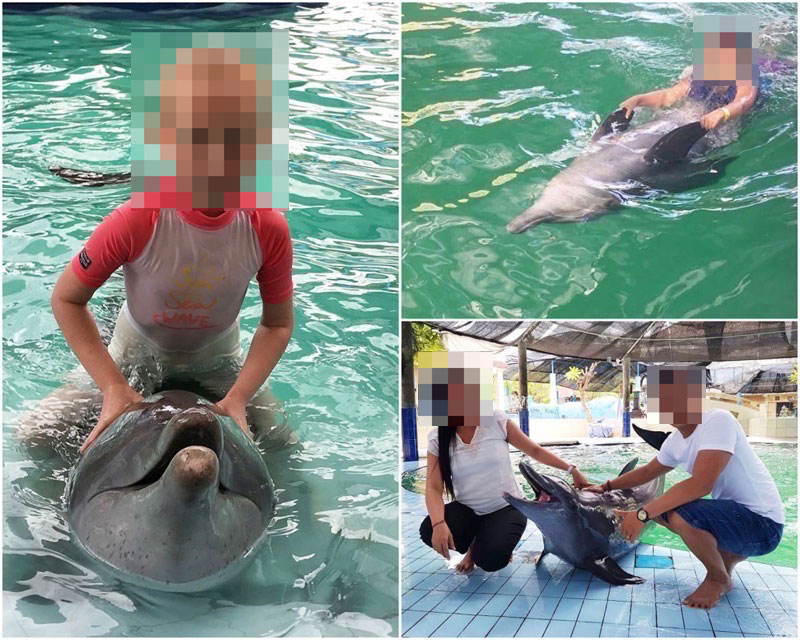
Fact: Just because a dolphin appears to be smiling doesn’t mean that it is happy!
What can you do?
Animals suffer in the name of entertainment (dolphins, elephants and more); it’s time to do something about it and stop animal cruelty once for all!
-
Calling for all animal-lovers and tour operators: Please stop supporting any kind of animal tourism activities that use exploited animals for profit. Your choices on holiday have the power to reduce demand for cruel attractions and save animal lives.
-
If you really wish to see wild dolphins, we highly encourage you to choose an ethical tour operator to ensure it is enjoyable for both you and the dolphins! (With more tourists for demanding for ethical dolphin tours, operators would likely strive to meet this demand too.)
-
Other initiatives you can take part in: Donate to BAWA (Bali Animal Welfare Association) as they help to make a difference to the lives of animals of Bali!
4. Poor caged civet cats are forced to make your luxurious Luwak coffee

The problem:
Cruelty in a cup; there’s a dark truth behind what’s commonly known as “the most expensive coffee in the world” (also known as “cat shit coffee”😜)!
Traditionally, Luwak coffee is made from coffee beans plucked from civets’ faeces, but that’s not always how the process goes. It’s very rare and very difficult to collect these droppings (and hence very costly), so the most cost-efficient method is for Kopi Luwak manufacturers to keep their own civet cats in cages and feed them with coffee cherries – which is nothing similar to their diet when in the wild as they feed on insects and plants.
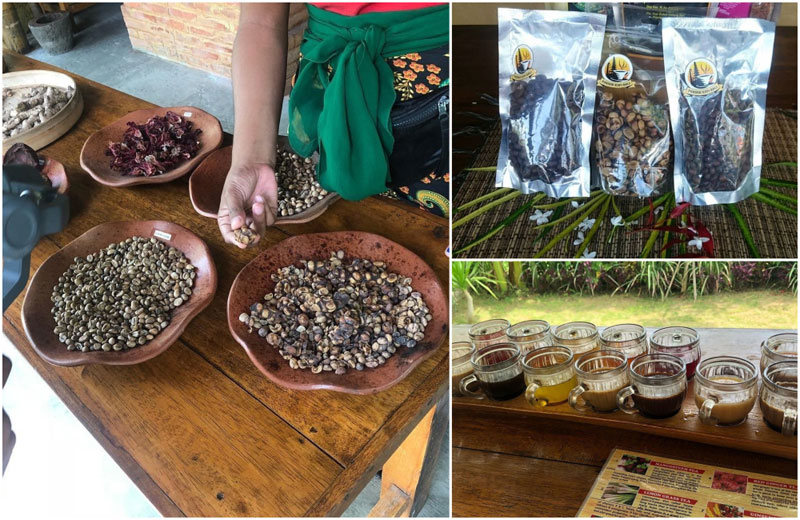
The disturbing secret is that the cages they are kept in are often filthy and the civet cats are crammed in small space with terrible conditions. Some are even observed to be injured during undercover missions by the media. In fact, all Kopi Luwak manufacturers fail basic animal welfare requirements.
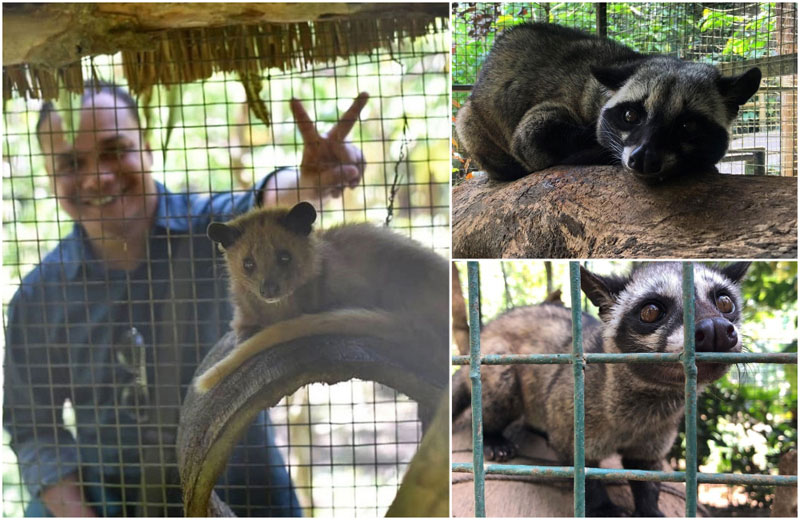
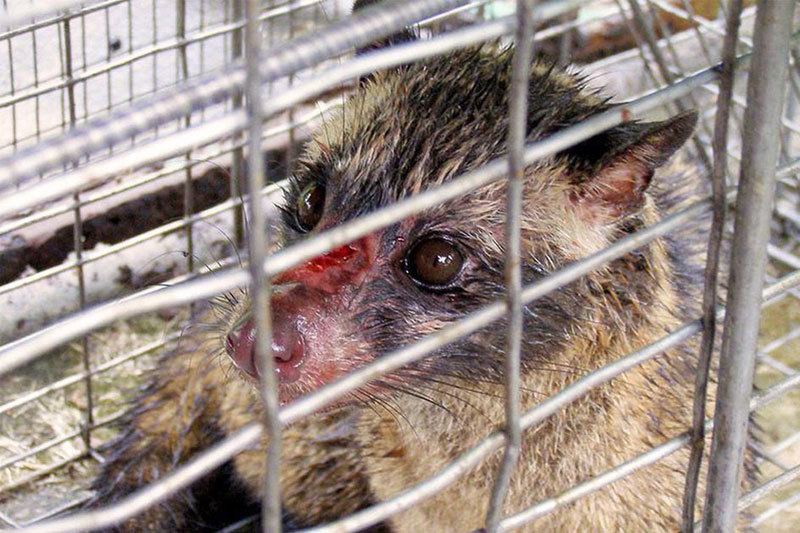
The civet cats also suffer from terrible health conditions with some being shockingly thin due to their poor diet, while others are obese for not being able to run around freely. In addition, many of them have limited to no access to clean water.
Still fancy a cuppa?
What can you do?
A high percentage of all coffee sold as Kopi Luwak today is actually fake. Most of them have been produced away from civet cats and should you, however, manage to get your hands on the real deal, you’ll be sipping what amounts to nothing but pure liquid suffering!
Simply do not purchase Luwak Coffee of any kind, regardless of whether they are said to be from wild Luwak or not, as it is almost impossible to verify the truth.
You surely do not want to spend a ridiculous amount of money on a souvenir that is contributing to an industry of animal abuse that serves no purpose!
Note: As a general rule of thumb, to not support animal cruelty, do not purchase any animal parts as souvenirs as well!
5. Rice paddies should be valued for their rice, not their postcard-pretty views!
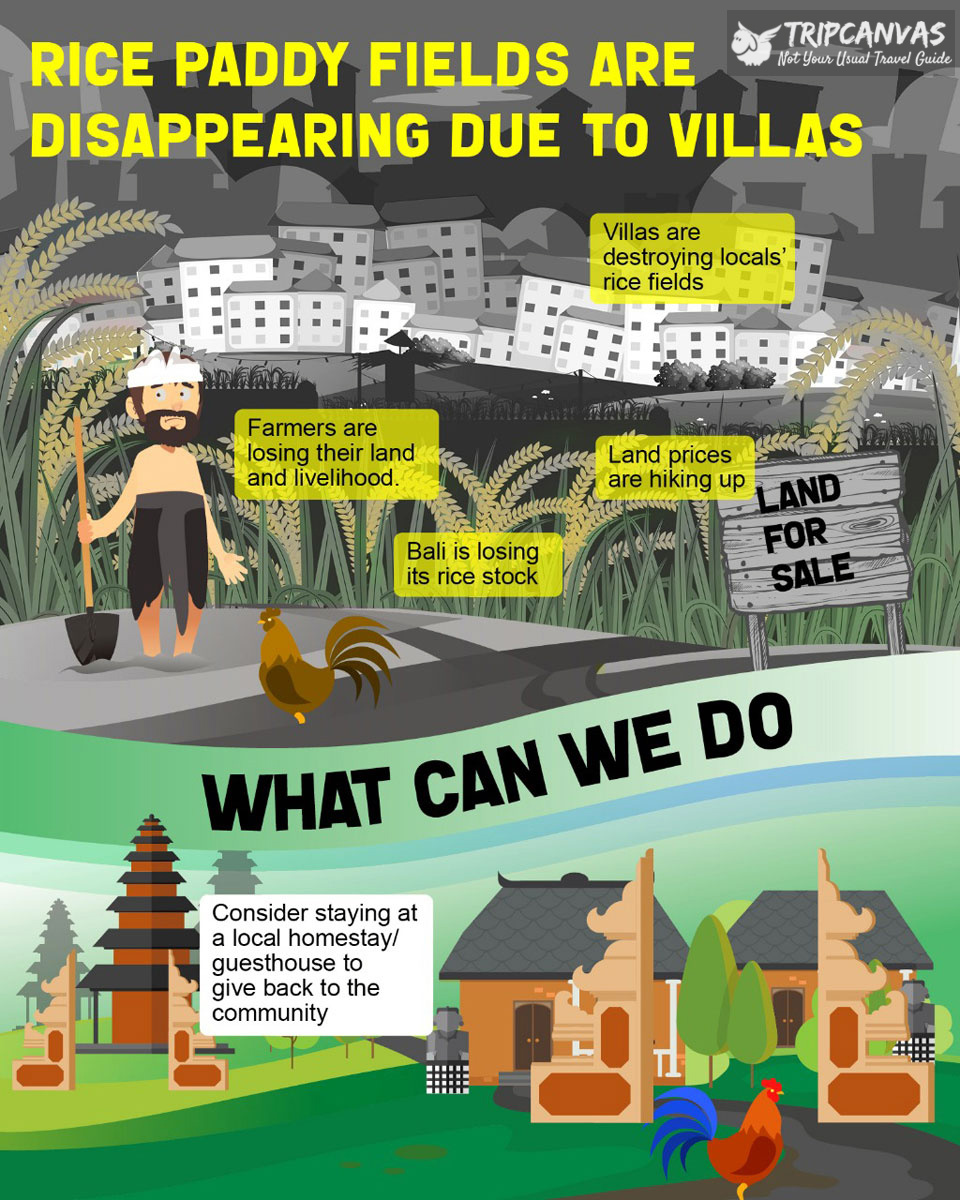
Villas in the middle of rice fields may look pretty and offer tons of Instagram opportunities, but the ugly truth is that they might also indirectly cause issues with the rice paddies. Local irrigation starts to deteriorate as water is channeled into the villas and bathtubs.
Similarly, building too many villas and resorts in the paddy fields might be a result of locals losing their plot of land and their livelihoods as their fields are now replaced by luxury properties.
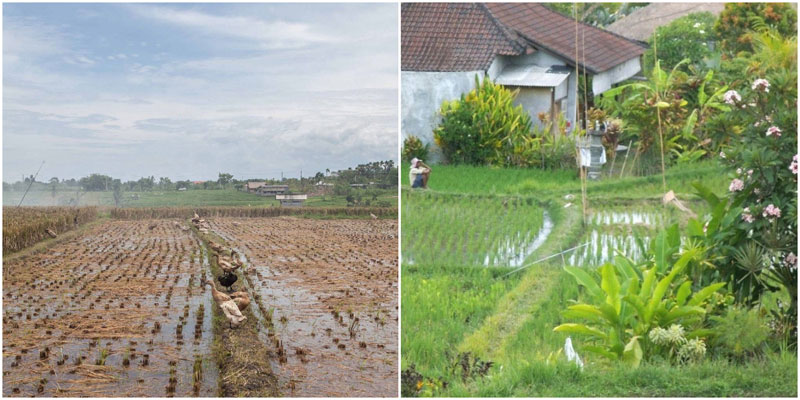
Bali has limited land, so this not only threatens Bali’s self-sufficiency in rice production but also leads to an increase in land prices, as well as higher taxes.
The irony is that more and more paddy fields are being converted, while the main draw for most tourists here in Bali is to seek tranquillity amidst the paddy fields!

What can you do?
The next time you’re booking yourself a holiday in Bali, why not try to be a little selective in your accommodation choice?
-
Consider the impacts the villa has on the environment but also on the local community.
-
Stay in a local homestay or guesthouse if you must (or really want) to stay in the middle of the paddy fields, because they have modest use of water (no fancy bathtubs or jacuzzis) and most of the time, these places are built using sustainable materials like bamboo.
We know that these are just the tip of the iceberg of the issues that Bali is facing, and we hope to raise more awareness of these issues and as we do our best to start work with relevant organisations.
We hope this story has inspired you to take action to help protect the environment while on vacation in Bali. If you’re doing something good and are following our green tips, remember to use #TripCanvasGreenerBali, we would love to know!
Share your thoughts with us
Share your thoughts with us
 Bahasa Indonesia
Bahasa Indonesia 简体中文 (Chinese)
简体中文 (Chinese)